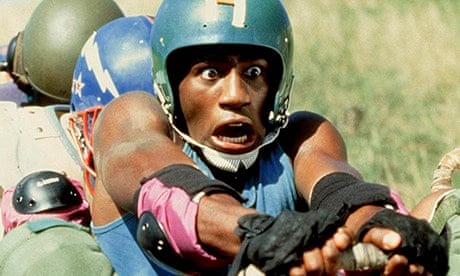In York, four male students have been criticised for painting their faces black and dressing as characters from the film Cool Runnings, in which a group of Jamaicans enter a bobsleigh competition. The students wore black morphsuits, had painted black skin and one donned a dreadlock wig.
The news follows reports that law students in Edinburgh this month painted their faces to dress as Somalian pirates for an "around the world" themed party. Meanwhile at the University of London, a student with a painted black face recently won a fancy dress competition at a union event.
"I've noticed that it's happening more now," says Aaron Kiely, Black Students Officer for the NUS. "It's deeply worrying, because it fuels racist stereotypes about black people.
"If you're a black student walking around campus and you see people who have dressed up to mock you, what kind of environment does that make for people who want to learn?"
Isabelle Scott and Sairish Tahir, racial equality officers at York University, agree that the phenomenon is on the rise: "Perpetuating racial stereotypes to create shock value seems to be an increasingly common theme across young people at universities now."
They point out that painting faces black was a popular form of entertainment in the 19th century. "Blacking up is steeped in a history of discrimination, degradation and bigotry. It began in the 19th century to dehumanise an entire race for the amusement of the privileged and elite."
Helena Horton, a student at York University, says not everyone is convinced there's anything wrong with blacking up: "A lot of people have defended [wearing black paint], saying 'what's wrong with black faces anyway', and 'it's a joke – they're having fun, not being malicious'."
"'Bad taste' or 'politically incorrect' parties are in vogue at the moment," says Eleri Watson, a student at Durham University, who has held discussion groups about racism and sexism at university.
"At one party we heard about, white people blacked up to pretend to be slaves. There have also been people dressed as Nazis, the twin towers and Jimmy Savile. It's common to see costumes like that. It's branded as banter or as ironic."
"Some people think it's funny," says Sofia Hewson, a student at Durham University. "And if you call them out, you're branded as humourless. Students are in a cocoon at uni, where they don't have to participate in real life and they're protected from being judged."
In lad culture, racism and sexism can thrive, says Hewson. "Students are in a bubble and so some think they can do what they want."
"Universities seem to give students who do things like this a slap on the wrist," says Watson. "In the real world you could get fired, or be punished by law. If students go into a job and expect that it's alright to behave like this, then they'll have a rude awakening."
The student union at Birmingham University recently tried to tackle the issue by banning any costume deemed racist from campus venues. The blanket ban drew criticism from many students, for targeting all costumes that could be seen as racist, including some based on fictional countries.
So is a blanket ban the best way to go?
Jonathan Blausten, a student at Birmingham University, wrote an open letter criticising the union's ban at Birmingham and accusing it of "perverting what is a very important conversation".
He said: "By cutting out even the slightest mention of race, or by looking for wrongdoing when it isn't there, they're giving themselves no leg to stand on when someone is actually racist.
"There's no difference in treatment, and no room to make an example of someone. This stupid, catch-all policy is lazy, and students are being punished for no reason."
But when it comes to painting faces black, many feel a hardline policy is necessary and justifiable. "I fully support a zero tolerance approach," says Kiely. "We have to say that it's unacceptable, especially on our campuses and in public places."
More awareness is needed, some students say. "It's a case of changing the culture," says Watson, "rather than having a ban."
"We need to promote a healthier culture," says Hewson. "Universities need to actively discourage racism and raise awareness, not just put measures in place once something has happened."

Comments (…)
Sign in or create your Guardian account to join the discussion